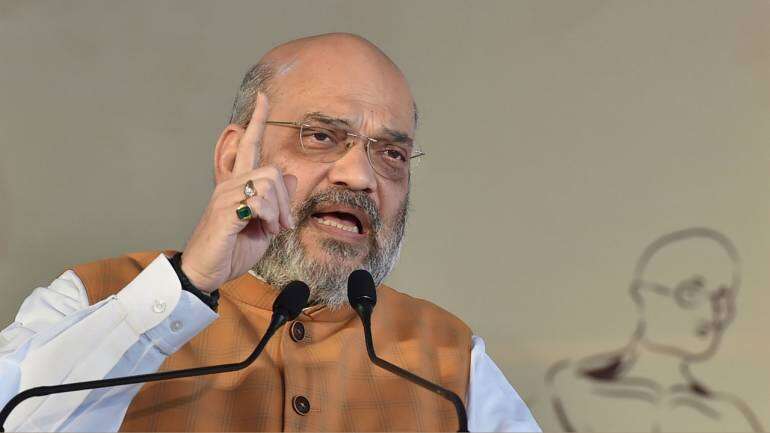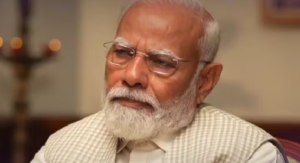Siddharth Varadarajan
In speech after speech, Union home minister Amit Shah and other Sangh Parivar leaders like Mohan Bhagwat have been insisting that no Hindu will ever be deported from India when their plan to create a National Register of Citizens (NRC) is enforced across the country.
At a political rally in Kolkata on October 1, Shah said, “I want to assure all Hindu, Sikh, Jain, Buddhist and Christian refugees that you will not be forced to leave India by the Centre. Don’t believe rumours. Before NRC, we will bring the Citizenship Amendment Bill, which will ensure these people get Indian citizenship.”
Now, if—like me—you were brought up on the values of the Indian Constitution, you would likely be scratching your head and asking how on earth a minister could speak like this. Granted, he is talking about refugees and not Indians, but by what canon of morality, law or tradition is it okay for the home minister to say India will welcome any and every kind of refugee as long as they are not Muslim?
The fact is that all this talk of refugees and immigrants is classic dog-whistle politics, and is an integral part of the Narendra Modi government’s overarching strategy of dividing the Indian people on the basis of religion.
That is why leaders like Amit Shah are trying to scare Muslim citizens and make them feel insecure about their place in their own country, while telling Hindus that this country really belongs to them and reassuring them that they will never have to fear their citizenship or devotion to the country being questioned.
This kind of politics goes against not just the letter and spirit of the Constitution but marks a potentially dangerous turn—even by the violent track record of Hindutva organisations. But beyond that, Shah’s reassurance to Hindu refugees, and those who care only for them, rests on a gigantic fib.
Ever since the 2014 Lok Sabha election, when Modi and the Bharatiya Janata Party (BJP) first began playing dangerous communal politics over India’s laws governing foreigners and citizenship, the government has moved swiftly to segment and eventually even segregate the country’s residents on the basis of religion. Let us be very clear about this monstrous reality: if we take Amit Shah’s words at face value, the only people without the requisite documentation who will actually face deportation once an NRC-type exercise is run across India will be Muslims.
India has more than 1.3 billion residents, the overwhelming majority of whom are citizens. A tiny, tiny fraction of the country’s population comprises foreigners. Most of them are probably long-term residents and it is safe to assume the majority do not have proper entry or residence documents because successive governments simply never bothered to create a rational migration and refugee policy. Of these, the largest single group are of Bangladeshi origin, but there are also people from Tibet, Sri Lanka, Myanmar, Afghanistan and Pakistan, most of whom have been living in India for years and have children who are full-fledged Indian citizens.
Labour migration is a fact of life, in South Asia and around the world, and is a product of underlying economic dynamics in which labour shortages are actually transmitted from region to region. For example, economic opportunities in North America lead to Punjabis migrating out of India. Biharis then come to Punjab to work the farms. But this means there are less Biharis available to work in West Bengal and Delhi, which pulls workers in from Bangladesh. Like Indians, Bangladeshis also migrate to the West, leading to skill shortages back home. A few years ago, the World Bank published data that Indians working in Bangladesh had remitted $3.7 billion back home that year—roughly half the amount that Bangladeshi workers in India send home each year.
Now India and the Indian people are very sensitive to the mistreatment of Indian migrants worldwide—rightly so—including those who are undocumented. Yet when it comes to the fate of undocumented migrants in India, we behave just as horribly as the worst racists in the West. Just look at the language that the government, the media and even the courts use to describe undocumented migrants: we call them “infiltrators”.
An infiltrator conjures up the image of a man with a gun coming to kill people. But an undocumented migrant is someone who crosses a border in order to make an honest day’s wage. Now, we have Amit Shah calling Bangladeshi migrants ‘termites’ and promising to drive them out of India. It is not clear where he intends to send those whom his government is able to identify; into the Bay of Bengal perhaps? Because Bangladesh has said repeatedly that it does not believe the people India wants to deport are Bangladeshis and thus will not accept them. That is why Modi has been forced to reassure Sheikh Hasina that she need not worry about the NRC and External Affairs Minister S. Jaishankar has said the consequences of the exercise is and will remain an internal matter for India.
The NRC process has already turned 1.9 million into virtually stateless people. Now Shah wants to compound the problem that has arisen in Assam by replicating this dangerous exercise in West Bengal and other parts of India. Since many Hindus have also ended up in this excluded list, the home minister is busy reassuring Hindus in Bengal and elsewhere who fail to produce the proper papers that their Indianness will not be in doubt. This assurance is a blatant violation of his oath of office that obliges him to “do right to all manner of people in accordance with the Constitution and the law, without fear or favour, affection or ill-will.”
Shah’s plan hinges on communalism, fear and division but also on a lie. This is because the government’s plan to accommodate Hindu, Buddhist, Sikh, Jain and Christian refugees from Bangladesh, Pakistan and Afghanistan has a cut-off date and that date is December 31, 2014.
In 2015 and 2016, the government amended the Passport (Entry into India) Rules and the Foreigners Act rules to declare that migrants belonging to those specific religions from these three countries would never be considered “illegal immigrants” in law provided they came to India before December 31, 2014. The proposed Citizenship Amendment Bill will make it easier for these same groups to acquire Indian citizenship, but again provided they came in before December 2014.
The carve-out for all religions except Islam, the limited geographic scope of the move and the cut-off date are proof of not just the government’s communalism but total insincerity and dishonesty as well.
If India wants to adopt a genuinely humanitarian policy towards refugees from neighbouring countries, it should open its doors to all victims of religious persecution and not just non-Muslims. This means Hindus from Bangladesh or Pakistan should be welcomed, but so should Ahmadiyas, Hazaras or anyone else.
Second, either you have a policy for the neighbourhood or you don’t. Why are Modi and Shah being humane to the religiously persecuted from just Bangladesh, Afghanistan and Pakistan? Why not Myanmar and Sri Lanka? By what logic is the government excluding Rohingya Muslims fleeing persecution in Myanmar, or Tamil Muslims and Hindus fleeing violence or persecution in Sri Lanka, should the situation (heavens forbid) ever worsen there?
Now Shah and his apologists will likely scoff at these objections because—as their guru Mohan Bhagwat reminded us recently—India is a ‘Hindu Rashtra’ and must therefore open its doors to Hindus who have nowhere else to go, while Muslim refugees have dozens of Muslim countries to seek refuge in. This is, of course, idiotic but if their heart really bleeds for Hindu refugees, why do they have a 2014 cut-off date?
Why is there no space in their new citizenship amendment for Hindus persecuted in Pakistan or Bangladesh since 2015 who fled to—or want to flee to—India?
The reason Narendra Modi and Amit Shah have no place for them is because they love power more than they love refugees, even Hindu ones. They know that if they were to scrap the cut-off date—which already violates the 1971 cut-off date stipulated in the Assam Accord—voters in Assam will surely throw the BJP out of power there.
So how do you “appease” Assamese sentiment while also appealing to Hindu sentiments in the rest of India? Modi and Shah calculated that the 2014 cut-off date would help them strike a balance between appealing to Assamese sentiment—which is fiercely against giving Indian citizenship to any Bangladeshi, even Hindu ones—and using the citizenship and NRC process to polarise the whole country and consolidate their Hindu vote bank.
This is the ugly politics which Shah is engaging in; it should surprise us that this politics requires the use of ugly, vulgar words like ‘infiltrator’ and ‘termites’. Depending on how desperate the BJP is to divert the attention of voters away from the real issues, the NRC exercise could be used to polarise India in ways we cannot even imagine.
Sadly, as of today, no one—not even the Supreme Court—seems willing to stop them.
(Siddharth Varadarajan is journalist, political analyst and academic. He is a Founding Editor of The Wire. He was earlier the Editor of The Hindu.)




